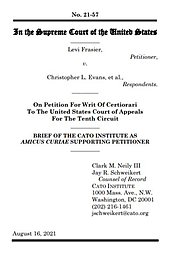Learn more about Cato’s Amicus Briefs Program.
In August 2014, Levi Frasier observed Denver police officers arresting a man in public for a drug offense and using what Frasier believed to be excessive force, so he began recording them with his tablet. When the officers saw Frasier filming them, one shouted “camera!,” and they gathered around him, demanding that he show them the video, threatening to arrest him, and searching his tablet without his consent. Frasier subsequently brought a Section 1983 suit against these officers, alleging a violation of his First Amendment right to record the police in public.
At the time of this incident, four different circuit courts had explicitly held that citizens do have a First Amendment right to record the police in public, with no court holding to the contrary. Moreover, the Denver police department had explicitly trained its officers as to the existence of this right since 2007, and the officers in this case had participated in a training session covering exactly this issue just a year prior to the incident. Nevertheless, notwithstanding that these officers had actual knowledge that they were violating Frasier’s First Amendment rights, the Tenth Circuit still held that they were entitled to qualified immunity – because while several other circuits had already addressed this issue, the Tenth Circuit in particular had not decided this exact question. Thus, according to the panel, the law was not “clearly established” in the Tenth Circuit.
Frasier’s case exemplifies all the core perversities of the doctrine of qualified immunity. In particular, it clearly illustrates how the “clearly established law” standard has nothing to do with whether officers were acting in good faith, but instead turns entirely on the happenstance of the fact patterns of prior judicial decisions. Cato has therefore filed an amicus brief in support of Frasier’s petition to the Supreme Court. That petition does not call for the Court to reconsider qualified immunity entirely, but it does raise two important but narrower issues – whether non-judicial material is ever relevant to determining whether constitutional rights are “clearly established,” and whether defendants should be able to receive qualified immunity when they have actual knowledge that they are violating someone’s rights. Even if the Justices are not interested in reconsidering qualified immunity itself, this petition presents them with an ideal opportunity to rein in the worst excesses of the doctrine.

This work is licensed under a Creative Commons Attribution-NonCommercial-ShareAlike 4.0 International License.


